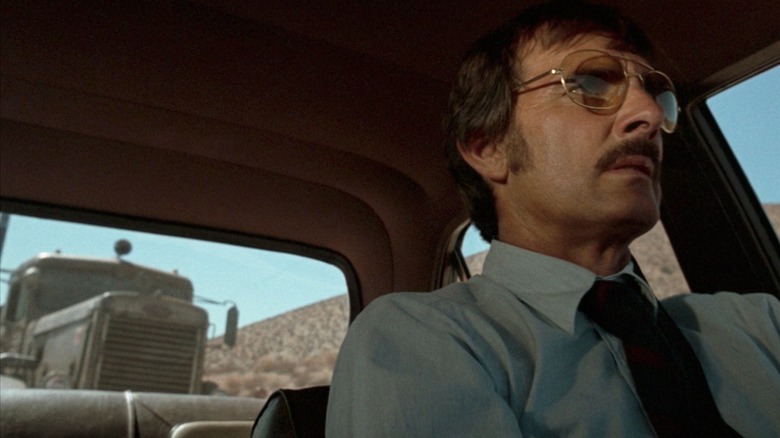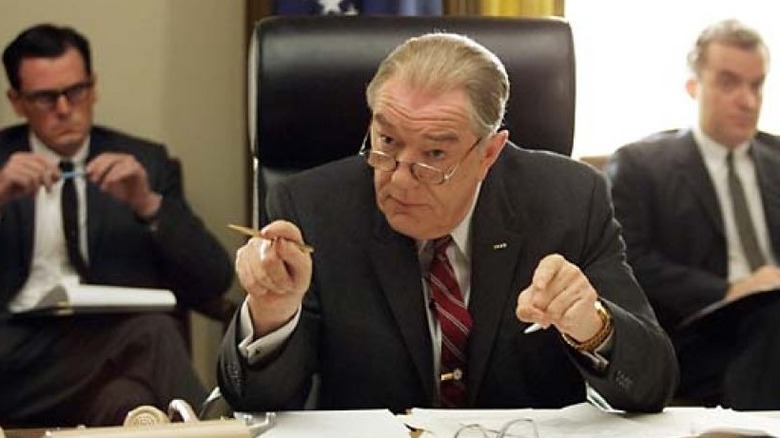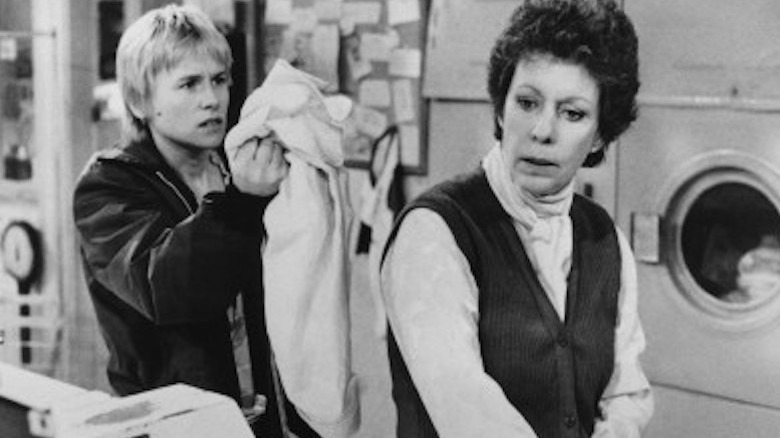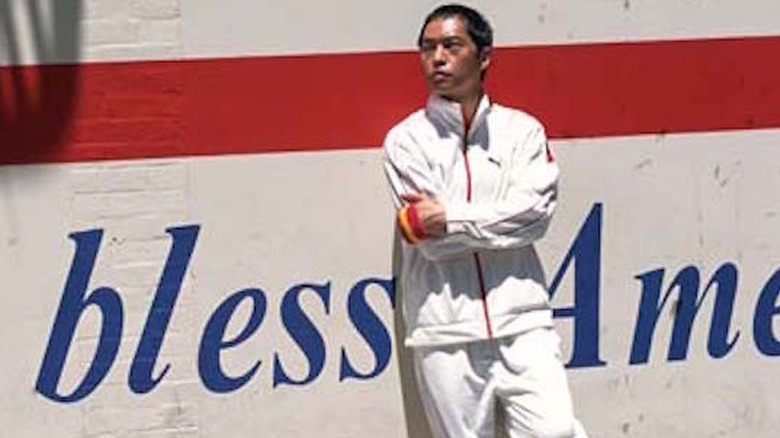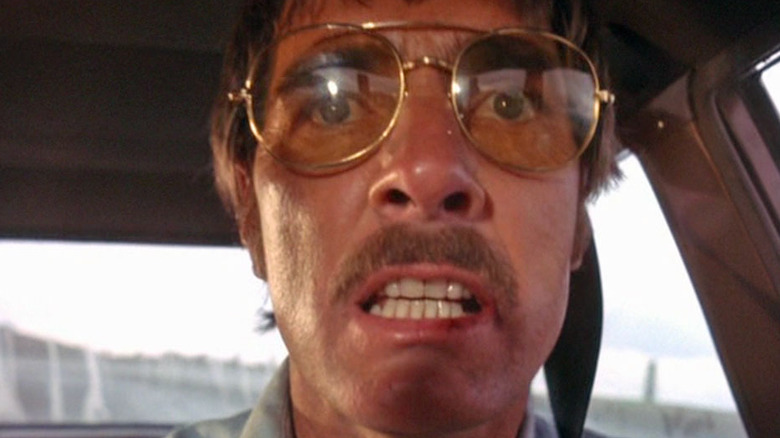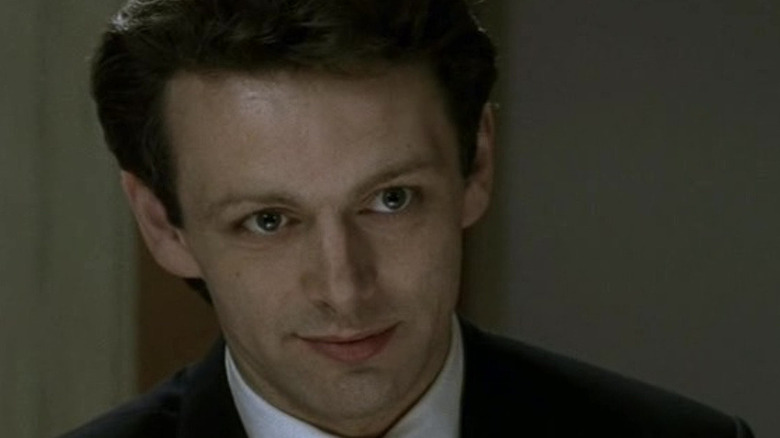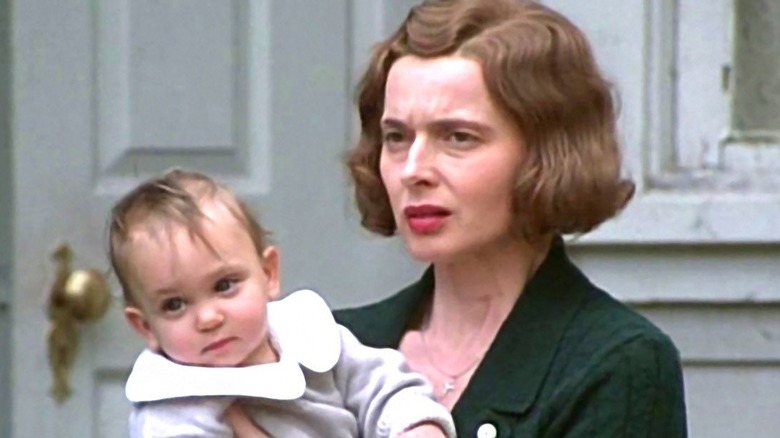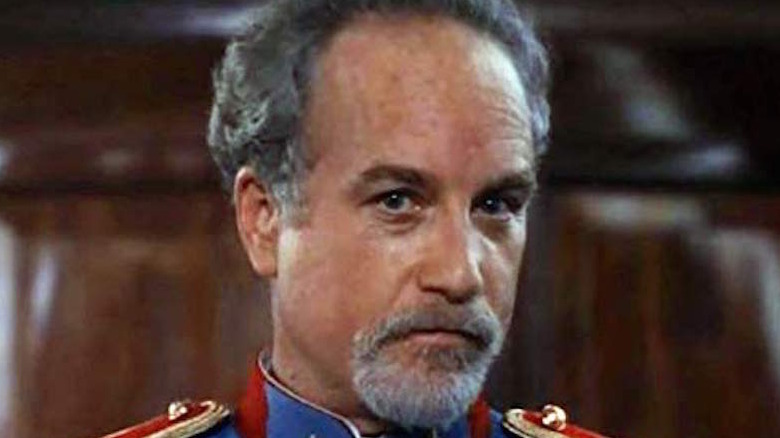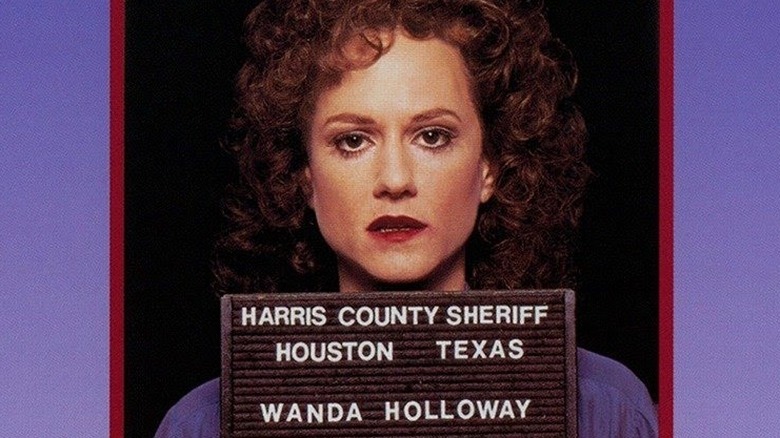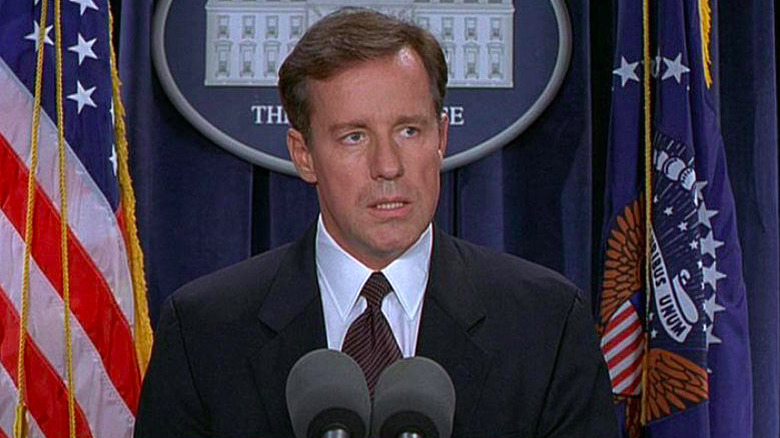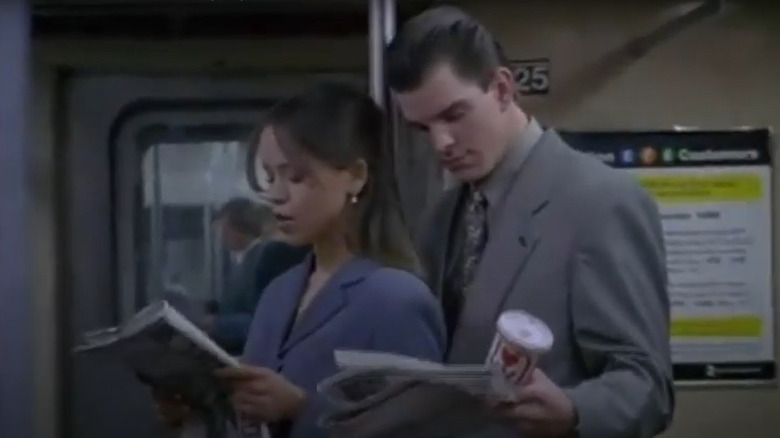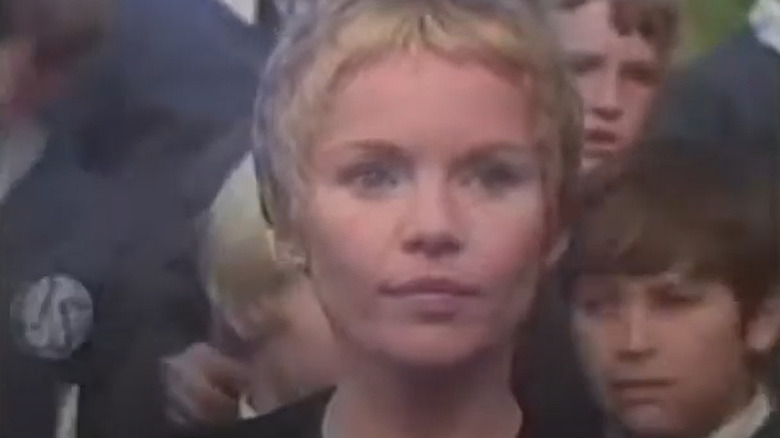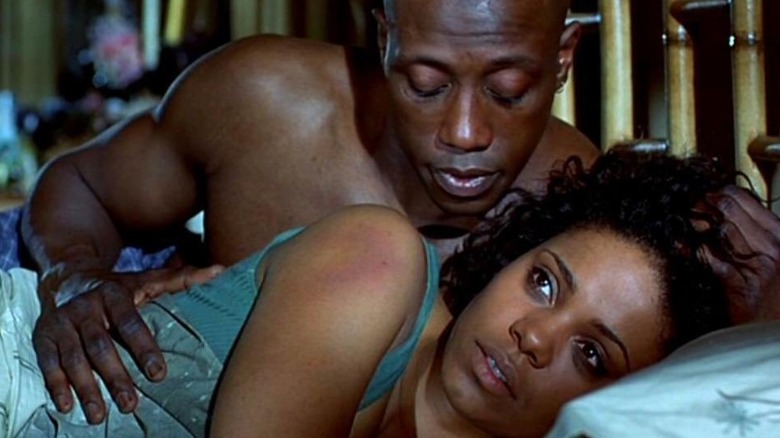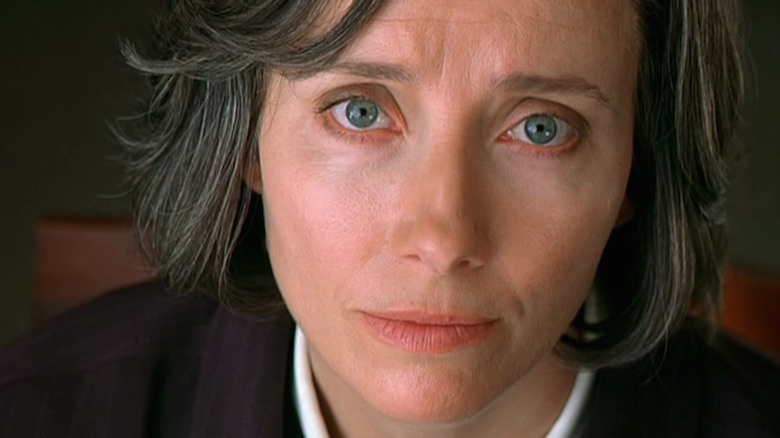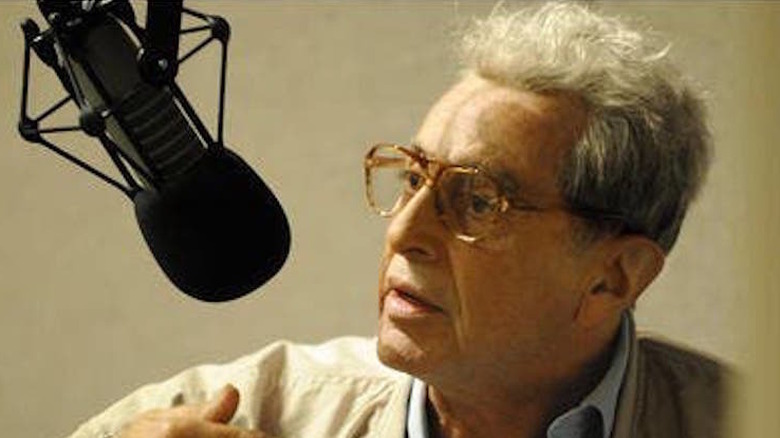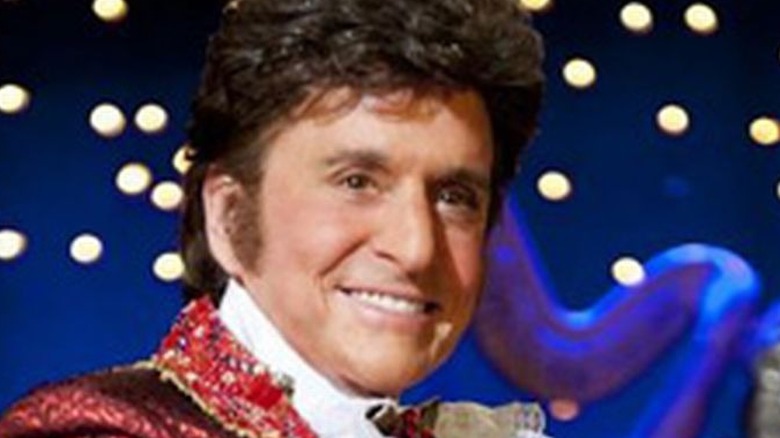Great TV-Movies Directed By Legendary Filmmakers
Television's status as the home of crowd-pleasing but lowbrow entertainment has changed dramatically during the past quarter century. Series like "The Sopranos," "Game of Thrones," "NYPD Blue," and "thirtysomething" have shown that terrestrial and cable networks are willing to tackle stories with the same depth and skill expected from feature films. As a result, popular and celebrated writers, producers, and directors who have worked almost exclusively in theatrical releases have explored series projects on television, including Martin Scorsese, Kathryn Bigelow, Frank Darabont, and Jane Campion.
Made-for-TV movies have also become platforms for film directors to tell engaging and emotionally involving stories that are on par with their big-screen work. The following list — which contains spoilers — offers critically praised and award-winning TV-movies from the past four decades made by a host of legendary directors, including more than one Oscar winner, as well as genre specialists and groundbreaking artists.
John Frankenheimer: Path to War
After directing some of the most acclaimed suspense films and social dramas of the 1960s — including "The Manchurian Candidate," "Seconds," and "Seven Days in May" — filmmaker John Frankenheimer rebounded from a career dry spell in the 1970s and '80s with a string of acclaimed made-for-TV movies that focused on flashpoint events of American history. He won Emmy awards for 1994's "Against the Wall" (about the 1971 riots at Attica Prison) and "The Burning Season" with Raul Julia as activist Chico Mendes. Then came miniseries 1996's "Andersonville," about a notorious Civil War prison camp, and 1997's "George Wallace," with Gary Sinise as the controversial Alabama governor. After returning to features with 1998's hit "Ronin," Frankenheimer made his last TV-movie, as well as one of his most thought-provoking projects.
"Path to War," which aired on HBO in 2002, starred Michael Gambon as President Lyndon B. Johnson, who wrestled with the political and moral quandaries of sending more troops to Vietnam at the height of the conflict in 1968. Frankenheimer and writer Daniel Giat show Johnson besieged on all sides by a cabinet split between hawks like defense secretary Robert McNamara (Alec Baldwin) and opponents of the conflict like advisor Clark Clifford (Donald Sutherland). Far from being a dry history lesson, "Path to War" shows an emotional and nuanced portrait of a complicated figure — Johnson was a crude speaker but a passionate supporter of human rights — locked in an unwinnable situation. "Path to War" earned Frankenheimer his final Emmy and Directors Guild Award nominations, while netting Sutherland a Golden Globe and Emmy nods for Gambon, Baldwin, and Giat, among others.
Robert Altman: The Laundromat
Like John Frankenheimer, the film career of Robert Altman experienced a decline in the 1980s, during which he divided his time between smaller independent productions like "Fool for Love" and made-for-TV projects. Altman, who began his career directing episodes of "Alfred Hitchcock Presents" and "Bonanza," oversaw a number of ambitious TV projects in the '80s including the Emmy-winning political miniseries "Tanner '88," and "Basements," an anthology film of complex plays by Harold Pinter. Between these efforts, Altman also directed "The Laundromat," an hour-long production based on a play by Marsha Norman ("'night, Mother") for HBO in 1985.
"The Laundromat" is essentially a "two-hander," with Carol Burnett and Amy Madigan as women visiting a Laundromat (actually a set in Paris) to complete late-night washing. The pair couldn't be more different — Burnett's character is a reserved teacher and Madigan plays an anxious housewife — but over the course of the hour, their conversations reveal common ground in disappointment, fear, and untapped hopes. Though "Laundromat" comes to a quirky conclusion, it's also an excellent showcase for Altman's skill with actors and in crafting emotionally resonant stories from everyday situations. The production earned four ACE Award nominations, including wins for Madigan and Altman.
Spike Lee: Sucker Free City
In addition to his Oscar-winning feature film career, Spike Lee has also lent his insight and vision to other genres and mediums, including the Oscar-nominated documentary "4 Little Girls," concert films like "The Original Kings of Comedy" and "David Byrne's American Utopia," TV series ("She's Gotta Have It"), music videos for Michael Jackson, Prince, and Eminem, and television commercials. His TV-movie output is comparatively limited but does include the critically praised "Sucker Free City."
Intended as a pilot for Showtime, "City" looks at the interaction between Black, white, and Asian gangs in San Francisco, as well as the political, social, and economic factors that affect their neighborhoods and drive them to crime. The mix of drama and commentary is handled with typical deftness by Lee, who's supported by a terrific cast of diverse players led by Anthony Mackie ("The Falcon and the Winter Soldier"), Ken Leung ("Lost") and Ben Crowley as his leads. Unfortunately, Showtime declined to pick up "Sucker Free City" after airing the pilot in 2004.
Steven Spielberg: Duel
Frequently cited as one of the best made-for-TV movies of the 1970s, the "ABC Movie of the Week" presentation "Duel" also marks the feature-length directorial effort by Steven Spielberg and one of his earliest successes. The drama, adapted by Richard Matheson from his own short story, stars Dennis Weaver as a businessman whose drive across the Mojave Desert is bedeviled by an increasingly aggressive tanker truck driver. What begins as a simple road rage soon becomes a life-and-death struggle against a faceless, anonymous force that targets Weaver's character for death simply for attempting to pass him on the road.
A huge ratings success upon its release in 1971, Universal Television hired Spielberg to shoot additional scenes to fill out its running time to feature length for an international theatrical release. "Duel" earned two Emmy nominations, including a win for film sound editing, but more importantly, it served as a calling card for Spielberg's singular talents, which would earn an even bigger and more successful showcase in 1975 with the release of "Jaws."
Stephen Frears: The Deal
The first in a trio of film projects by director Stephen Frears and writer Peter Morgan about England's former Prime Minister Tony Blair, "The Deal" established Michael Sheen in a star-making lead role. "The Deal" is set just prior to Blair's appointment as PM while he's engaged in an alleged shadowy agreement with fellow Labour Party leader Gordon Brown (played in the film by David Morrissey of "The Walking Dead"). The 1994 agreement, also known as the Granita Pact, reportedly entailed Brown allowing Blair to run for PM in exchange for considerable power as the Chancellor of the Exchequer or government finance minister. Though both men initially claimed that the meeting never took place, Brown — who also became PM in 2007 — later admitted to its existence in a 2010 interview.
It's not necessary to understand U.K. politics in order to appreciate "The Deal," which aired on the U.K.'s Channel 4 in 2003. What makes the film memorable are the performances by Sheen, whose Blair is polished but conniving, and Morrissey as Brown, a hesitant public performer undone by Blair's machinations. Frears, an Oscar-nominated and Emmy-winning director who examined the dark side of wheeler-dealers in films like "The Grifters," "Dangerous Liaisons," and "Hero," mines suspense and surprising emotion from what is essentially a series of political conversations — no small feat, but well handled by the expert cast. Frears continued to explore Blair's tenure as PM in the 2006 theatrical feature "The Queen" with Helen Mirren as Queen Elizabeth II.
Mark Rydell: Crime of the Century
Mark Rydell segued from acting in the 1960s to directing for television before moving into features at the end of that decade; he quickly proved adept at both genre films ("The Cowboys" with John Wayne) and emotionally fueled dramas like "The Rose" and "On Golden Pond," which earned him an Oscar nomination in 1981. After a string of misfires in the '90s, Rydell turned to television and scored a hit with "Crime of the Century," a 1996 HBO production based on one of the most shocking incidents in early 20th-century American history.
The crime in question is the kidnapping of airman Charles Lindbergh's 14-month-old son, who was held for ransom and murdered in 1932. Lindbergh's hero status spurred public demands for justice, to which the FBI responded with Bruno Richard Hauptmann, a German immigrant who was ultimately executed for the crime despite evidence that allegedly supported his innocence. Rydell focuses his film on Stephen Rea and Isabella Rossellini as Hauptmann and his wife, Anna, whose belief in the American Dream is destroyed by the machinations of a justice system determined to restore public faith. Both actors earned Golden Globe Award nominations, as did the film itself, which also netted four Emmy nominations, Including one for Rydell.
Ken Russell: Prisoner of Honor
Though perhaps best known for his taboo-busting and mind-altering feature films like "The Devils," "Altered States," and "Tommy," filmmaker Ken Russell began his career directing documentaries and biopics on artists and composers for the BBC in the 1960s. He would return to the medium throughout his long and eclectic career, including the telefilm "Prisoner of Honor," which aired on HBO in 1991. Actor Richard Dreyfuss co-produced and starred in the film, which examined "the Dreyfus affair," a military scandal that rocked French culture in the 19th and early 20th century (and for the record — the family connection between Richard Dreyfuss and the affair's namesake, Alfred Dreyfus, is unconfirmed.).
Dreyfuss played French Army counterintelligence officer Georges Picquart, who was assigned to review a case of espionage and treason involving Army captain Alfred Dreyfus. His investigation revealed that Dreyfus had been framed because of his religious affiliation — he was Jewish — and though Picquart himself was anti-Semitic, he refused to allow a fellow soldier to suffer the indignity of lost honor through a false accusation.
Lending gravitas to the production — which won a CableACE award for costume design — were a host of famed British actors, including Russell's frequent collaborator Oliver Reed, as well as Peter Firth, Brian Blessed, and fellow filmmaker Lindsay Anderson as the French minister of war.
Michael Ritchie: The Positively True Adventures of the Alleged Texas Cheerleader-Murdering Mom
In a tribute to the late filmmaker Michael Ritchie, Entertainment Weekly wrote, "It's difficult to think of any director, ever, who had a more consistently uneven career." It's a fair assessment, given that Ritchie, who died in 2001, helmed as many critically praised and well-loved films ("The Bad News Bears," "Fletch") as flops ("Student Bodies," "The Golden Child," "A Simple Wish"). One of his best efforts came with "The Positively True Adventures of the Alleged Texas Cheerleader-Murdering Mom," a biting black comedy for HBO that aired in 1993.
Based on a real-life case from 1991, "Adventures" starred Holly Hunter in an Emmy-winning turn as a Lone Star State mom fixated on transforming her daughter into a cheerleading star at her middle school. A series of setbacks — including a disqualification when Hunter's character tries to bribe tryout judges — spurs her to put a hit on her best friend (Elizabeth Ruscio), whose own daughter makes the team. Beau Bridges captured both the Emmy and Golden Globe as her brother-in-law — a hapless slob who also happens to be one of the few characters in "Adventures" with anything like a moral compass.
Ritchie, who won the DGA Award for "Adventures," knew his way around small-town foibles and warped dreams of stardom, having directed 1975's "Smile," about the machinations behind a beauty pageant. He'd also dug into the darker side of competitions, especially those involving kids through "Bad News Bears" and films like "Wildcats," "Diggstown" and "The Scout." Those experiences gelled perfectly in "Adventures," which also served as a reminder of his best work.
Joe Dante: The Second Civil War
Barry Levinson co-produced the darkly satiric and alarmingly prescient HBO production "The Second Civil War," which Joe Dante directed in 1997. Though Dante was best known for his feature films like "Gremlins" and "Innerspace," he also directed for TV throughout his career, from episodes of "Police Squad!" and "Eerie, Indiana" to two of arguably the best segments in the "Masters of Horror" anthology series. "Second Civil War" offered Dante an opportunity to apply his often-anarchic sense of humor and cultural perspective outside of the horror and science fiction genres and yielded impressive results.
Set in a United States where craven politicians and the media have made immigration a hot button topic, "Civil War" stars Beau Bridges in an Emmy-winning turn as the sleazy governor of Idaho who closes his state's borders to a flood of Pakistani refugees fleeing a nuclear attack by India. This triggers a standoff with the President (Phil Hartman), a dolt addicted to daytime soaps whose decisions are delivered by a scheming advisor played by James Coburn. Both sides send in troops, and the situation soon escalates to all-out war between anti- and pro-immigrant forces, the invasion of Idaho, and the destruction of national monuments, including the Statue of Liberty.
Though played for laughs, the script by Martyn Burke ("The Pentagon Wars," "Pirates of Silicon Valley") roots the action in authentic-sounding politics, which are delivered with a straight face by the excellent cast. Dante and Burke also spare no quarter for the cable news cycle, as personified by Dan Hedaya's scheming executive and a crew of sanctimonious newscasters and reporters played by James Earl Jones and Denis Leary.
Jonathan Demme/Julie Dash/Abel Ferrara: Subway Stories
HBO asked New Yorkers to submit their real-life stories about experiences on the city's famed (and infamous) subway system, 10 of which were dramatized by an array of acclaimed directors for 1997's "Subway Stories: Tales from the Underground." Jonathan Demme handled the opening segment, with actor Bill Irwin as a traveler trapped on a subway with a particularly noxious package. "Daughters of the Dust" helmer Julie Dash wrote and directed "Sax Cantor Riff," a moving segment about subway performers that reflects the power of music to uplift and move, even in less-than-ideal settings.
Bob Balaban tackled "The 5:24," with Steve Zahn as a finance broker weighing a seemingly foolproof investment scheme by veteran analyst played by Jerry Stiller, while the late Ted Demme ratcheted up the tension with "Manhattan Miracle," with Gregory Hines trying to determine if a passenger played by Anne Heche is planning to jump on the subway tracks. The most offbeat story comes courtesy of cult favorite Abel Ferrara, who observes train passengers Rosie Perez and Michael McGlone engaging in a wordless and chaste but still steamy physical connection during their morning commutes.
John Badham: Reflections of Murder
Before helming the pop culture juggernaut "Saturday Night Fever" in 1977 and '80s hits like "WarGames," "Blue Thunder," and "Stakeout," John Badham worked extensively in television, first as a director for episodic series like "Night Gallery" and "The Streets of San Francisco," and later on such TV-movies as "Isn't It Shocking?" and "The Gun." Shortly before making "Saturday Night Fever," Badham directed the made-for-TV thriller "Reflections of Murder," which drew on a classic international suspense film for inspiration.
"Murder," which aired on ABC in 1974 was a remake of "Les Diaboliques," a 1955 French feature released in the United States as "Diabolique." Badham and writer Carol Sobieski ("Fried Green Tomatoes") took the film's warped love triangle — an abusive husband's wife and lover pair up to murder him –- and moved it to a small U.S. coastal island, where a schoolteacher played by Sam Waterston terrorizes his wife (Joan Hackett) and fellow teacher-slash-secret girlfriend (Tuesday Weld). The pair hatches what seems like the perfect plan to dispatch Waterston's character, which appears to succeed ... before he turns up alive again.
Badham's efficient but effective direction manages to deliver feature-grade suspense on a small-screen budget and draws uniformly excellent performances from the cast, which includes Oscar nominee Michael Lerner ("Barton Fink") and the late Lance Kerwin. Fans of Waterston's earnest character on "Law & Order" may be floored by his turn here as a particularly hateful individual who deserves his comeuppance at the hands of his victims.
Gina Prince-Bythewood: Disappearing Acts
Emmy-winning writer-director Gina Prince-Bythewood, who has earned recent raves for "The Old Guard" and "The Woman King," helmed this HBO production from 2000 that features Wesley Snipes in a rare non-action-oriented role. Though Snipes is the marquee name in the film and serves as co-producer, co-star Sanaa Lathan is the actual focus of the film as an aspiring singer-songwriter who enters into a relationship with the contractor (Snipes) working on her new apartment in Brooklyn. The pair clash, then come together over mutual physical attraction which soon develops into something deeper ... and more complicated.
Prince-Bythewood and writer Lisa Jones (who adapted the novel by Terry McMillan) deliver plenty of romance and drama for viewers. Snipes' character and Lathan's character are attracted to the way they make each other think and feel, and that connection lends heft to the periods in which they clash, especially as Lathan's singer's career heats up and Snipes' contractor stagnates. "Disappearing Acts" is anchored around emotional intelligence, not Valentine's Day card affection, and real aspirations. Most importantly, it shows how adults can navigate both and find a deeper connection, even if they pull apart, as the two leads do in the film's conclusion.
Mike Nichols: Wit
Mike Nichols' long and storied career as a feature film director includes a staggering array of critical and popular hits, from "Who's Afraid of Virginia Woolf" to "The Graduate," "Carnal Knowledge," "Silkwood," "The Birdcage," and "Charlie Wilson's War." His experiences on television largely took place early in his career as a comic performer with Elaine May, though he made two extremely well-received forays into directing for TV in the early 2000s: "Wit," based on the Pulitzer Prize-winning play by Margaret Edson, and Tony Kushner's "Angels in America," which also claimed a Pulitzer for drama.
"Wit," which aired on HBO in 2001, starred Emma Thompson as an English literature professor whose life of study is transformed when she's diagnosed with terminal stage ovarian cancer. She undergoes a dramatic course of treatment by her doctor (Christopher Lloyd) that proves ineffective. As the disease and additional treatments slowly rob her of her dignity and her physical well-being, she takes solace that she has at least retained her wit, which she shares with the viewer through monologues.
Nicholas and Thompson's sensitive and frequently moving treatment of the challenges faced by patients at the end of their lives reaped numerous positive reviews and awards, including seven Emmy nominations and three wins, including for Thompson and Nichols; "Wit" also earned the 2001 Peabody and Humanitas Prizes, as well as a special prize for Nicholas from the Berlin International Film Festival.
Barry Levinson: You Don't Know Jack
Director Barry Levinson has enjoyed success in both features and on television for more than four decades. An Oscar winner and Golden Globe winner for "Rain Man," "Bugsy," and "Avalon," Levinson also served as executive producer on such critically acclaimed series as "Homicide: Life on the Street" and "Dopesick." In recent years, Levinson has also directed for television, most notably on "The Wizard of Lies" with Robert De Niro and "Paterno" with Al Pacino, which was his second of two collaborations with the Oscar-winning actor. Their previous project together was "You Don't Know Jack," about the pathologist Jack Kevorkian, who assisted terminally ill patients in ending their lives during the 1990s.
Pacino's Kevorkian is motivated by his mother's own suffering at the end of her life, but there's also his overwhelming need to be recognized by the public as a crusader. Levinson and Pacino have a difficult subject to tackle in both assisted suicide and Kevorkian's approach to it — he ends his patients' suffering but also boosts his own ego, which leads to grandstanding, outrageous proclamations, and ultimately his undoing when he administers a lethal dose to a non-terminal patient. It's to their credit — and to the supporting cast, which includes Brenda Vaccaro as Kevorkian's sister, John Goodman, and Danny Huston — that both are handled with sensitivity and clarity. "Jack" earned six Emmy nominations, including wins for Pacino and writer Adam Mazer, as well as nods for Levinson as both producer and director.
Steven Soderbergh: Behind the Candelabra
The dizzyingly eclectic CV of Steven Soderbergh covers a vast array of genres and mediums: indie favorites like "Sex, Lies, and Videotape," crowd-pleasing titles like the "Magic Mike" and the "Ocean's Eleven" franchise, and dramas like "Erin Brockovich," "Traffic," and "Kimi." He's ventured into television on several occasions, most notably as executive producer on "The Knick" and "The Girlfriend Experience." In 2013, he made his TV-movie debut with "Behind the Candelabra," a biopic of the performer Liberace for HBO.
Michael Douglas stars as the legendary showman, who died of complications from AIDS in 1987, with Matt Damon as Scott Thorson, a naïve entertainment industry hopeful who becomes Liberace's lover. Given Liberace's penchant for glitzy costumes and semi-camp performances, it's easy to think that "Candelabra" will be a warts-and-all confessional, like the memoir by Thorson on which the film is based. But Soderbergh instead turns his project into an extended meditation on image and perception; Liberace, an openly gay man whose abundant charm wards off audiences' concerns about his sexuality, sees Thorson as both his lover and his son, and attempts to literally make him in his likeness (via Rob Lowe's creepy plastic surgeon). The confusion of images also fuels the film's most dramatic point — Liberace and Thorson view their roles in each other's lives in very different ways, which leads Thorson to sue the entertainer for palimony.
This depth of storytelling, combined with Douglas and Damon's performances, make "Candelabra" a memorable and ultimately heartbreaking experience. The film swept the Emmys in 2014, claiming 11 awards, including outstanding movie, as well as trophies for Douglas, Soderbergh, costuming, makeup, editing, and sound.
